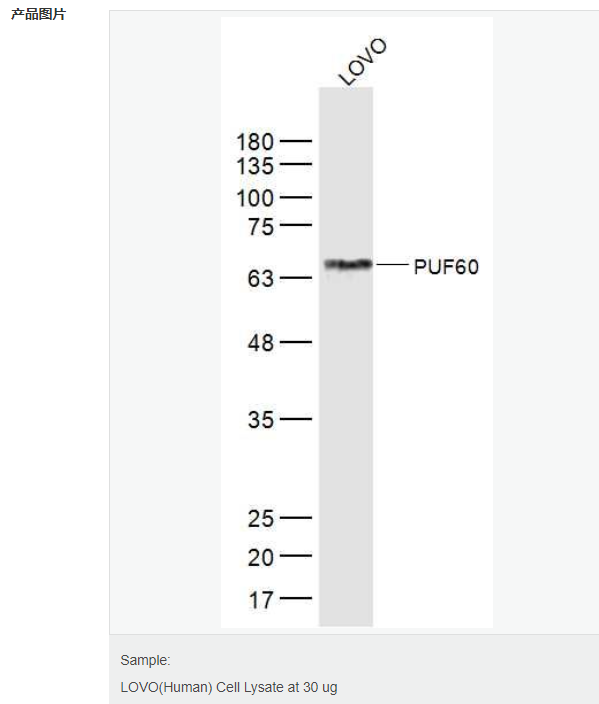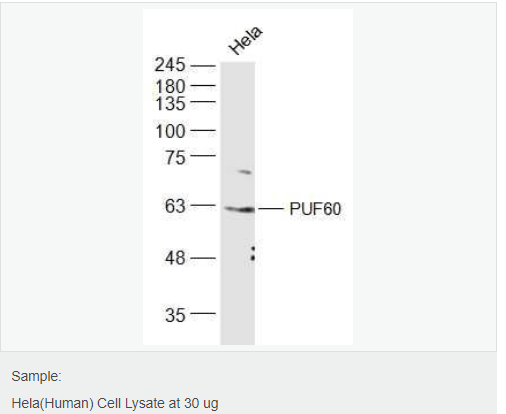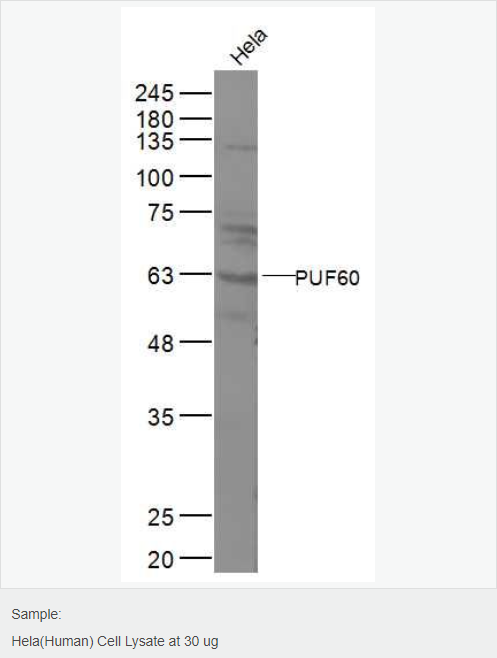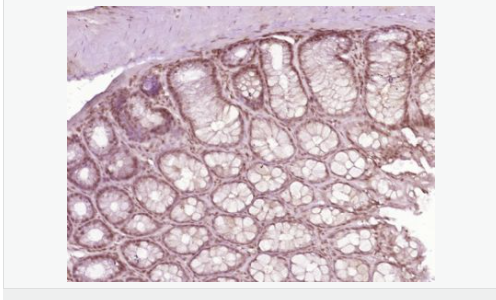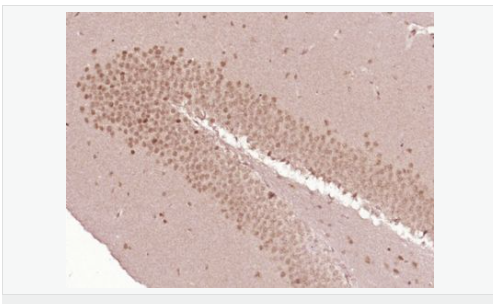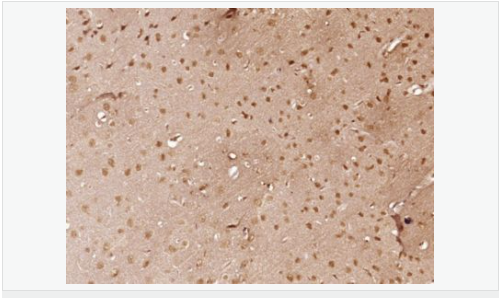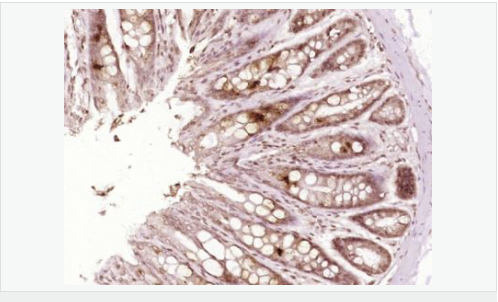
货号
产品规格
售价
备注
BN40569R-100ul
100ul
¥2360.00
交叉反应:Human,Mouse,Rat 推荐应用:WB,IHC-P,IHC-F,IF,Flow-Cyt,ELISA
BN40569R-200ul
200ul
¥3490.00
交叉反应:Human,Mouse,Rat 推荐应用:WB,IHC-P,IHC-F,IF,Flow-Cyt,ELISA
| 英文名称 | PUF60 |
| 中文名称 | SIAH结合蛋白1抗体 |
| 别 名 | 60 kDa poly(U)-binding-splicing factor; FBP-interacting repressor; FIR; FLJ31379; FUSE-binding protein-interacting repressor; Poly U binding splicing factor 60KDa; Poly(U)-binding-splicing factor PUF60; poly-U binding splicing factor PUF60; PUF60; PUF60_HUMAN; pyrimidine tract binding splicing factor; Ro ribonucleoprotein-binding protein 1; Ro-binding protein 1; RoBP1; RoBPI; siah binding protein 1; Siah-binding protein 1; Siah-BP1; SIAHBP1. |
| 研究领域 | 肿瘤 转录调节因子 结合蛋白 表观遗传学 |
| 抗体来源 | Rabbit |
| 克隆类型 | Polyclonal |
| 交叉反应 | Human, Mouse, Rat, |
| 产品应用 | WB=1:500-2000 ELISA=1:5000-10000 IHC-P=1:100-500 IHC-F=1:100-500 ICC=1:100-500 IF=1:100-500 (石蜡切片需做抗原修复) not yet tested in other applications. optimal dilutions/concentrations should be determined by the end user. |
| 分 子 量 | 60kDa |
| 细胞定位 | 细胞核 |
| 性 状 | Liquid |
| 浓 度 | 1mg/ml |
| 免 疫 原 | KLH conjugated synthetic peptide derived from human PUF60:1-100/559 |
| 亚 型 | IgG |
| 纯化方法 | affinity purified by Protein A |
| 储 存 液 | 0.01M TBS(pH7.4) with 1% BSA, 0.03% Proclin300 and 50% Glycerol. |
| 保存条件 | Shipped at 4℃. Store at -20 °C for one year. Avoid repeated freeze/thaw cycles. |
| PubMed | PubMed |
| 产品介绍 | This gene encodes a nucleic acid-binding protein that plays a role in a variety of nuclear processes, including pre-mRNA splicing and transcriptional regulation. The encoded protein forms a complex with the far upstream DNA element (FUSE) and FUSE-binding protein at the myelocytomatosis oncogene (MYC) promoter. This complex represses MYC transcription through the core-TFIIH basal transcription factor. Alternatively spliced transcript variants encoding multiple isoforms have been observed for this gene. [provided by RefSeq, Aug 2012] Function: DNA- and RNA-binding protein, involved in several nuclear processes such as pre-mRNA splicing, apoptosis and transcription regulation. In association with FUBP1 regulates MYC transcription at the P2 promoter through the core-TFIIH basal transcription factor. Acts as a transcriptional repressor through the core-TFIIH basal transcription factor. Represses FUBP1-induced transcriptional activation but not basal transcription. Decreases ERCC3 helicase activity. Does not repress TFIIH-mediated transcription in xeroderma pigmentosum complementation group B (XPB) cells. Is also involved in pre-mRNA splicing. Promotes splicing of an intron with weak 3'-splice site and pyrimidine tract in a cooperative manner with U2AF2. Involved in apoptosis induction when overexpressed in HeLa cells. Isoform 6 failed to repress MYC transcription and inhibited FIR-induced apoptosis in colorectal cancer. Isoform 6 may contribute to tumor progression by enabling increased MYC expression and greater resistance to apoptosis in tumors than in normal cells. Modulates alternative splicing of several mRNAs. Binds to relaxed DNA of active promoter regions. Binds to the pyrimidine tract and 3'-splice site regions of pre-mRNA; binding is enhanced in presence of U2AF2. Binds to Y5 RNA in association with TROVE2. Binds to poly(U) RNA. Subcellular Location: Nucleus. Colocalizes partially with TROVE2. Tissue Specificity: Isoform 2 is expressed in colonic epithelium and colorectal epithelium cancer (at protein level). Isoform 6 is expressed in colorectal epithelial cancer but below detection level in colonic epithelium. Expressed in heart, brain, placenta, lung, liver, skeletal muscle, kidney, pancreas, spleen, thymus, prostate, testis, ovary, small intestine, colon and peripheral blood leukocytes. Similarity: Belongs to the RRM half pint family. Contains 3 RRM (RNA recognition motif) domains. SWISS: Q9UHX1 Gene ID: 22627 Database links: Entrez Gene: 22827 Human Entrez Gene: 67959 Mouse Omim: 604819 Human SwissProt: Q9UHX1 Human SwissProt: Q3UEB3 Mouse Unigene: 521924 Human Unigene: 29965 Mouse Unigene: 96174 Rat Important Note: This product as supplied is intended for research use only, not for use in human, therapeutic or diagnostic applications. |
